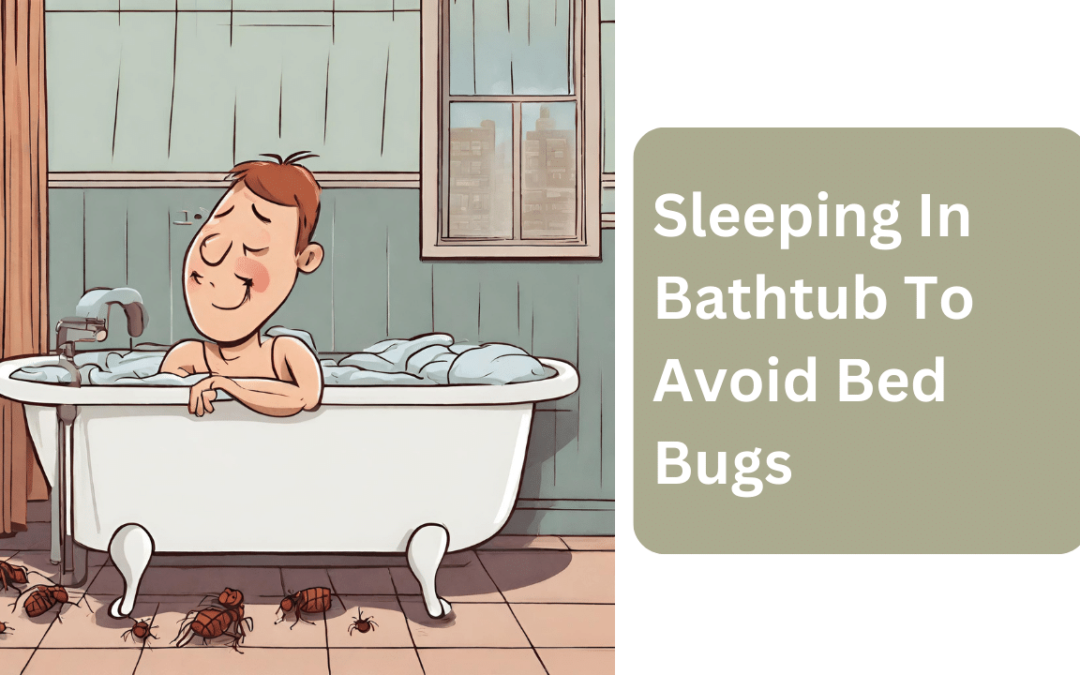Sleeping in a Bathtub to Avoid Bed Bugs: this phrase might sound like a line from a surreal comedy, but for many, it’s a severe consideration borne out of desperation and discomfort. Bed bugs, notorious for their stealthy existence and painful bites, have driven countless individuals to seek refuge in the most unlikely of places – their bathtubs. This unconventional method of evading bed bug bites symbolizes the extent of distress these tiny pests can cause.
Bed bugs, scientifically known as Cimex lectularius, are small, nocturnal insects that thrive on human blood. Their resurgence in recent years has become a significant public health concern. These pests are experts at hiding and can infest various areas of a home, particularly bedrooms, where they have easy access to their food source – humans. The problem with bed bugs is not just their bites, which can lead to itching, allergic reactions, and secondary infections, but also their psychological impact on the affected individuals. The constant worry of being bitten can lead to anxiety, stress, and sleepless nights, which, in turn, can severely impact one’s quality of life.
In this context, sleeping in a bathtub to avoid bed bugs emerges as a last resort for those seeking a night free from the torment of these pests. The idea is based on the assumption that bed bugs, lacking the ability to navigate smooth surfaces effectively, would be unable to reach someone nestled in the confines of a bathtub. While this might seem like a logical solution, it raises several questions about its practicality, effectiveness, and impact on a person’s physical and mental health. This article delves into the depths of this peculiar method, its feasibility, the science behind bed bug behavior, and alternative, more practical solutions for dealing with bed bug infestation.
What Are Bed Bugs?
Bed bugs are tiny, nocturnal insects that feed on human blood. These pests are excellent at hiding and can be found in mattresses, furniture, and electrical outlets. They are not known to transmit diseases, but their presence can cause itching, allergic reactions, and sleep disturbances.
The Problem with Bed Bugs
Bed bug infestations are a growing concern worldwide. These pests are challenging to eradicate due to their small size and hiding ability. The psychological impact of bed bugs can also be significant, leading to stress, anxiety, and sleeplessness.
Traditional Methods of Bed Bug Control
Typical bed bug treatments include chemical sprays, heat treatments, and thorough cleaning. However, these methods can be costly and may require multiple treatments to be effective.
Sleeping in a Bathtub: A Desperate Solution?
Desperate, some might consider sleeping in a bathtub a temporary escape from bed bugs. The logic is simple: bed bugs can’t swim, so a bathtub should be a safe zone.
Is it Effective?
While it might prevent bites for a night or two, this is not a viable long-term solution. Bed bugs can survive for months without feeding, so waiting them out isn’t practical. Plus, it’s uncomfortable and not conducive to a good night’s sleep.
Health Considerations
Sleeping in a bathtub can lead to back and neck pain, and the cold, hard surface is not ideal for restful sleep. Additionally, the stress of dealing with an infestation can take a toll on mental health.
Alternatives to the Bathtub
Consider other emergency solutions like using bed bug covers on mattresses and pillows or setting up bed bug traps. Regularly inspecting and cleaning your living space for a more long-term strategy can help prevent infestations.
Preventing Bed Bug Infestations
Preventive measures include:
- Inspecting second-hand furniture before bringing it home.
- Reducing clutter.
- Using protective covers on mattresses and pillows.
Professional Help: When to Call the Experts
Calling professionals is often best if you suspect a bed bug infestation. They have the expertise and tools to deal with the problem effectively.
DIY Solutions: Do They Work?
Some DIY solutions, like diatomaceous earth or essential oils, may offer temporary relief but are usually ineffective in eliminating an infestation.
The Cost of Bed Bug Removal
The cost of professional bed bug removal can vary widely. It’s essential to get multiple quotes and understand what each treatment entails.
Testimonials: Real-Life Experiences
We spoke with several individuals who tried the bathtub method. Most found it only a temporary fix and ultimately turned to professional help or other home remedies.
Conclusion
While sleeping in a bathtub might offer a night’s respite from bed bug bites, it’s not a feasible long-term solution. Understanding bed bugs, taking preventive measures, and seeking professional help are the keys to effectively dealing with these pests.
FAQs
Can bed bugs climb into bathtubs?
Bed bugs could be better climbers on smooth surfaces, so they’ll unlikely climb into a standard bathtub.
Are there any health risks to sleeping in a bathtub?
Physical discomfort and potential musculoskeletal issues are the main risks.
How can I tell if I have bed bugs?
Look for minor, reddish-brown bugs or tiny blood spots on your bedding.
What are the first steps to take when I notice bed bugs?
Start with a thorough cleaning and consider contacting a pest control professional.
Can I prevent bed bugs if I live in an apartment complex?
Regular inspection and cleanliness can help, but cooperation with neighbors and management is also crucial.
If you are looking for Bedbugs Services in Dhaka. Call Us Today

